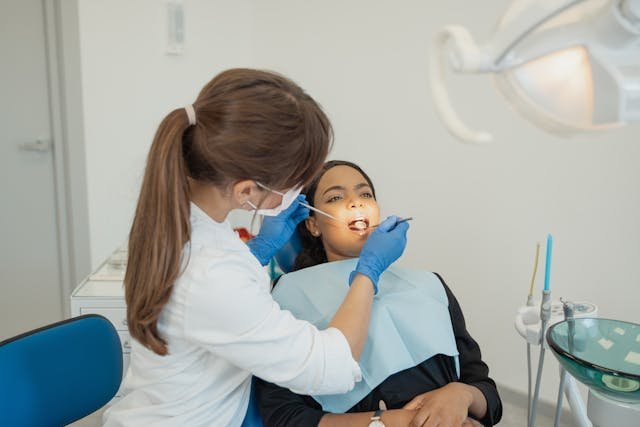The health of your mouth and body depends on dental care. Good oral hygiene prevents infections, improves looks, and boosts health. Dental hygiene principles may help you keep your teeth and gums healthy for life. This thorough dental care handbook covers the basics.
Table of Contents
1. Brushing Teeth

Cleaning your teeth is essential to dental health. It removes germs, plaque, and food particles that cause tooth decay and gum disease. Consider these crucial points:
- Frequency: Brush teeth twice day, preferably in the morning and before bed.
- Duration: Brush for two minutes every session to clean all tooth surfaces.
- Technique: Gently, circularly clean your teeth’s exterior, inner, and chewing surfaces. Remember to clean your tongue to eliminate germs and refresh breath.
You should use a soft-bristled toothbrush that fits comfortably. Replace toothbrushes every three to four months or sooner if bristles are frayed. Use fluoride toothpaste to improve tooth enamel and prevent decay.
2. Daily Flossing
A toothbrush can’t reach plaque and food particles between your teeth and beneath the gumline, so flossing is essential. How to floss well:
Wrap most of 18 inches of floss around your middle fingers, leaving an inch to work with. Slide the floss between your teeth and form a C-shape around each tooth, moving it up and down to remove dirt. Try floss picks, water flossers, or interdental brushes if floss is hard to use.
3. Mouth Washing
Add mouthwash to your dental hygiene regimen to fight germs and freshen your breath. Choose an antiseptic or antibacterial fluoride mouthwash to prevent cavities and gum disease. Use mouthwash once or twice daily after brushing and flossing. The label specifies the amount and period, generally 30 seconds.
4. Balanced Diet
Diet affects dental health. A nutritious diet promotes healthy teeth and gums. Sugar feeds oral bacteria, causing tooth decay. Cut down on sugary foods, drinks, and juices. Milk, cheese, and yogurt provide calcium, which improves tooth enamel. Saliva helps wash away food particles and neutralize oral acids. Drinking water rinses away food particles and microorganisms, keeping the mouth clean.
5. Regular Dental Exams

Maintaining dental health requires regular dentist appointments. Early detection and treatment by dentists prevents more severe disorders. Dental exams should be done twice a year. Your dentist may prescribe more frequent visits depending on your requirements.
Dental hygienists remove tartar and plaque that brushing and flossing can’t remove during a checkup. Dentists check for cavities, gum disease, oral cancer, and other disorders. X-rays might reveal issues missed during the checkup.
6. Teeth Protection
Dental treatment must include tooth protection. Sports mouthguards protect teeth from impact. Dentist-made mouthguards provide the most protection. If you grind your teeth at night, your dentist may suggest a nightguard to protect your teeth and reduce jaw strain. Do not use your teeth to open packages, bottles, or other things. Chipping, cracking, or breaking teeth might result.
Conclusion
Optimum oral hygiene is essential for optimum health. Keep your teeth and gums healthy by brushing, flossing, using mouthwash, eating a balanced diet, and getting regular dental checkups. Preventing tooth damage and detecting dental issues are also crucial. Children learn lifetime oral hygiene practices that keep their smiles healthy. Prioritizing dental care improves oral health and quality of life.

